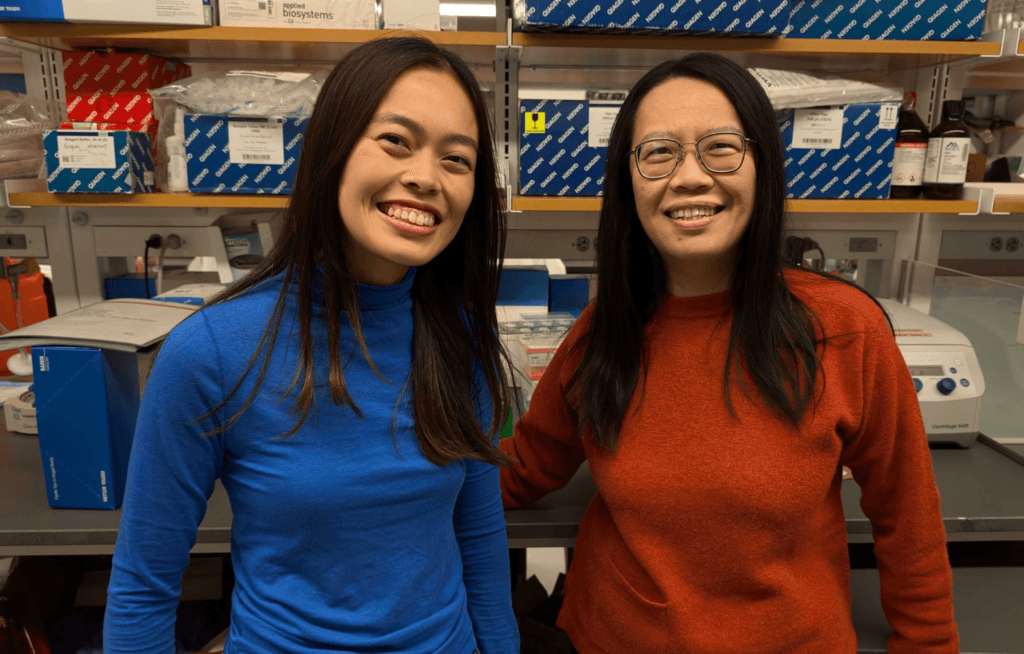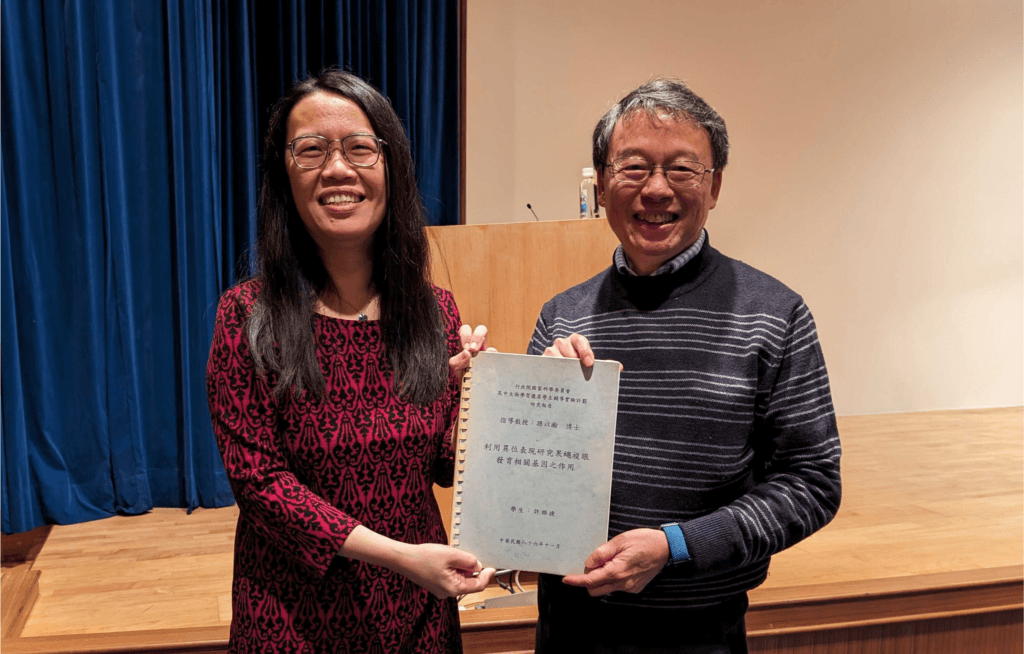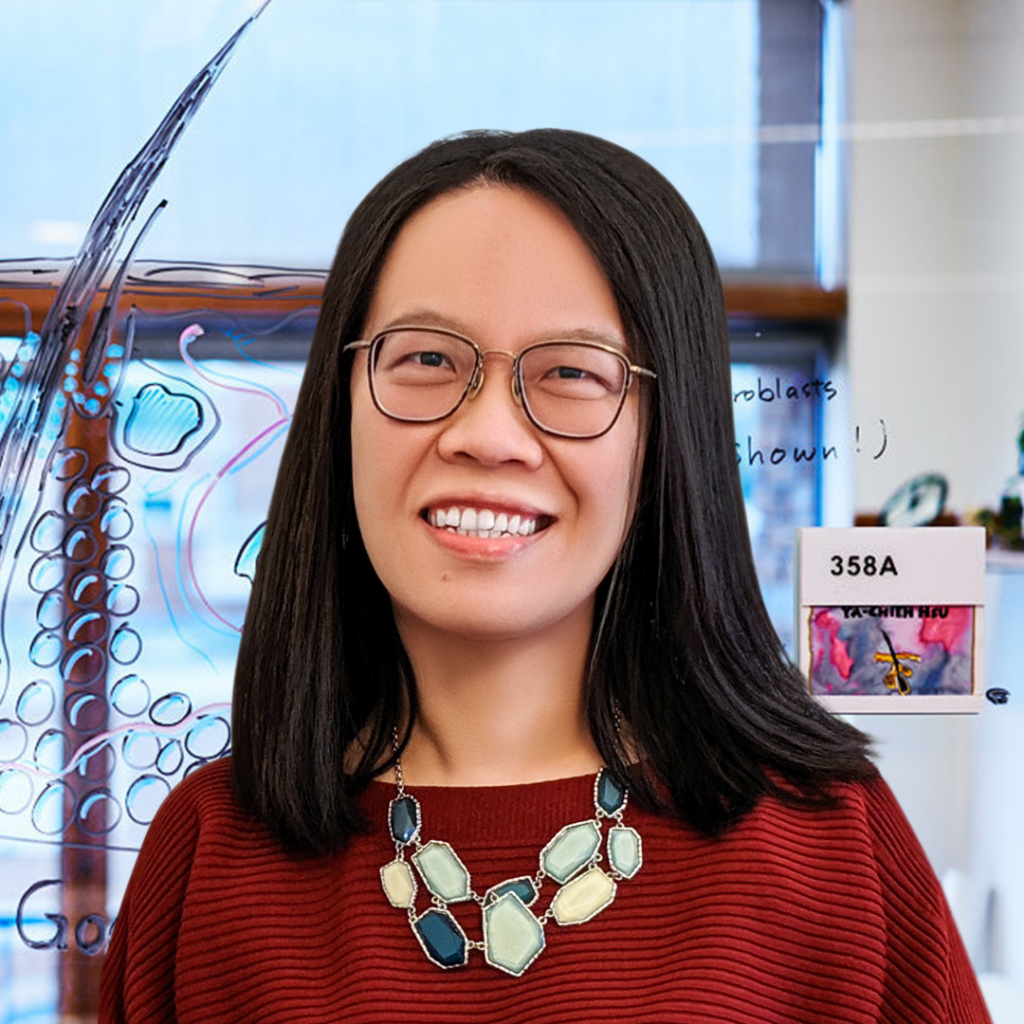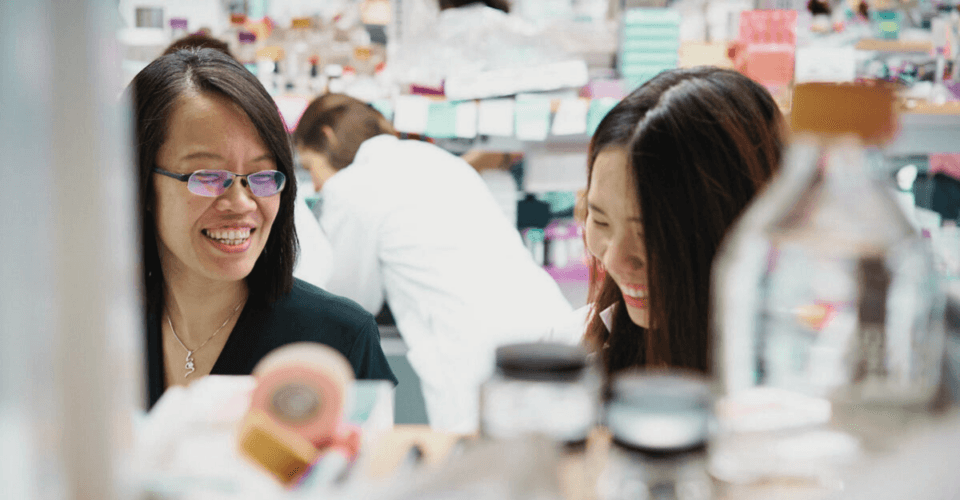Professor Ya-Chieh Hsu (to the left) in the lab at Harvard University.
19 November 2024
Ya-Chieh Hsu, Professor of Dermatology at Harvard University, will be looking at wound healing from a new angle: increased density of nerve fibers. The research has been made possible thanks to a LEO Foundation Serendipity Grant. “There is a pressing need for more effective strategies to accelerate wound healing and enhance regeneration,” Ya-Chieh Hsu says.
By Henrik Larsen
Pursuing an interesting hypothesis may indeed lead to new insight. Yet sometimes, as frequently experienced in science, pursuing a hypothesis may also lead to the discovery of something completely unexpected and intriguing. Something serendipitous, calling for further exploration.
And that’s exactly what happened in early 2024 to Ya-Chieh Hsu, Professor at Department of Stem Cell & Regenerative Biology at Harvard University.
She is one of five outstanding international scientists specializing in dermatology who were recently awarded a LEO Foundation Serendipity Grant to further explore an “unexpected discovery, which lies outside the scope of the project originally granted.”
Professor Hsu has a vivid memory of what happened that serendipitous day in her lab at Harvard:
She and Hannah Tam, one of her Ph.D. students, were conducting experiments aimed at developing new viral-based tools for gene manipulation of the skin—a research project made possible by a grant Ya-Chieh Hsu received in 2020 upon being rewarded the Leo Foundation Award for Region Americas.
“To evaluate these tools, we overexpressed fluorescent proteins and specific genes that could produce clear, observable changes. By testing that in mice, we were trying to evaluate the efficacy of the viruses we were working with—when Hannah and I suddenly saw this completely unexpected result. We both thought: ‘Wow, this is too interesting to pass up’,” Ya-Chieh Hsu recalls.

What they had—serendipitously—discovered was that increased density of nerve fibers at a wound site seems to somehow slow healing and increase scarring.
“The possible implications of this finding need to be further studied,” Ya-Chieh Hsu says and continues:
“One basic question we need to answer is whether increased nerve activity in a wound is a good or a bad thing for healing? This is a key question Hannah Tam and Shlomi Brielle, who is a Postdoctoral fellow in my lab, can now start looking into thanks to the Serendipity Grant. We hope our work will make a valuable contribution by identifying new strategies to accelerate wound healing and promote the regeneration of diverse cell types after injury.”
And there is an urgent need for such new treatments, Professor Ya-Chieh Hsu stresses:
“All over the world doctors and nurses are fighting a variety of very stubborn wounds. For example, chronic wounds – wounds that simply refuse to heal. They are common in patients with diabetes and among older people, and they frequently occur in conditions such as bed sores. There are also wounds that are extremely challenging to manage and often leave severe scars, as is frequently the case with burn patients. We have a pressing need for more effective strategies to accelerate wound healing and enhance regeneration.”
Do you think that a better scientific understanding of increased nerve activity in wounds could potentially improve treatment of other diseases, e.g. psoriasis?
“That is possible”, Ya-Chieh Hsu says and continues:
“There is growing evidence that neurons play a key role in various inflammatory and immune conditions, including psoriasis, Crohn’s colitis and HS. So, while the mechanisms can vary between diseases, further knowledge about how neurons influence these pathologies will be very helpful. In fact, my lab is actively exploring these somewhat ‘non-traditional’ roles of neurons, particularly in the context of development, regeneration, and inflammatory diseases.”
Very supportive parents
Ya-Chieh Hsu, 45, has had an impressive scientific career. But when she looks back at her childhood in Taiwan – where she grew up in Taipei, “a bustling city of 2.7 million people, about half the population of Denmark”—she clearly remembers that being a scientist and working in a research lab was not her initial dream of a future career:
“From a young age, I was drawn to creative and somewhat ‘impractical’ careers. I dreamed of being a writer long before I discovered science, and later I wanted to do research before I fully understood what it entailed. I guess I’ve always been a dreamer by nature.”
Her family background was not academic. Her father held various positions in different companies over the years, her mother was a travel agent. But her parents were deeply invested in education and did their best to give their children the opportunities they never had, Ya-Chieh Hsu says:
“My parents always gave me their full support, no matter how crazy my ideas seemed or how far they were from their understanding or imagination. I took this for granted at the time, but eventually realized how rare it was—especially in the more rigid culture I grew up in, where many parents encouraged their children to follow paths like medicine, finance or law, to have a more secure life.”
“I have always believed that if I’m passionate about something and think it is important, I should pursue it—even if the path isn’t clear. My parents’ unwavering support gave me the courage to follow my naïve optimism. I never worried about where things would lead or tried to live up to other people’s expectations because my brain just isn’t wired that way. This mindset has been incredibly liberating and has allowed me to approach science in a much more creative way.”
Henry Sun’s lab
Ya-Chieh Hsu’s first real encounter with science was in high school where she “by great luck stumbled upon an opportunity” to work in Professor Henry Sun’s lab at Academia Sinica in Taipei.
“There, I tested whether a new gene identified in Henry’s lab could control eye formation by expressing it in the leg of a fly. When the fly wouldn’t hatch, I carefully peeled off the pupal case under a microscope, and there it was—a leg with a big red compound eye! I was completely blown away. That was all it took. I thought: ‘OK, there’s nothing cooler than that—I want to be a scientist’; even though I had no idea what that really meant or what it would take!”
“Henry showed me so many things that I still carry with me to this day—what it’s like to follow one’s curiosity, the power of kindness and generosity, and the meaning of impact. He trained countless next-generation scientists throughout his career. My life was forever changed the day I knocked on Henry’s door,” Ya-Chieh Hsu says.

More than what meets the eye
Her fascination with skin began during her postdoctoral training in Dr. Elaine Fuchs’ lab at The Rockefeller University in New York where she wanted to broaden her expertise in developmental biology into stem cell biology and regeneration.
“I was drawn to tissues that naturally regenerate, particularly within a mammalian system. And in Dr. Fuchs’ lab I fell in love with the beauty and complexity of skin. It has so much to offer! Skin is much more than what meets the eye. It contains a wide variety of cell types—including epithelium, mesenchyme, neurons, blood vessels, and immune cells. And the interactions between these cells are vast and contribute to the diverse range of diseases that can manifest in the skin—in total around 3000! Skin is also our interface with the outside world and responds to systemic changes in the body. This makes it an excellent model to study how both bodily and environmental changes influence the skin—which is something my lab is very interested in as well.”
Receiving a LEO Foundation Serendipity Grant made Ya-Chieh Hsu both “very happy and incredibly grateful.” It also made her reflect on her own scientific career:
“And I realized that many of our most interesting and important findings over the years have in fact emerged from these unplanned moments rather than from our hypothesis.”
About Ya-Chieh Hsu

Education and Training
- 1998-2002: B.Sc. in Life Sciences, National Tsing-Hua University, Taiwan.
- 2000-2001: Visiting Student in Biochemistry, University of Toronto, Canada.
- 2002-2008: Ph.D. in Developmental Biology, Baylor College of Medicine, Houston, Texas. Advisor: Dr. Kwang-Wook Choi.
- 2008-2014: Postdoctoral Fellow, The Rockefeller University, New York, NY. Advisor: Dr. Elaine Fuchs.
Academic Employments
- 2014-2018: Assistant Professor – Dept of Stem Cell & Regenerative Biology, Harvard University.
- 2014-present: Principal Faculty – Harvard Stem Cell Institute
- 2015-present: Associate Member – The Broad Institute
- 2018-2021: Alvin and Esta Star Associate Professor – Dept of Stem Cell & Regenerative Biology, Harvard University
- 2021-present: Professor – Dept of Stem Cell & Regenerative Biology, Harvard University
- 2024-present: Harvard College Professor (named professorship)
- Professor Ya-Chieh Hsu has received more than 20 academic awards during her career, including The Pew Scholar; Harvard FAS Dean’s Award; Research Scholars Award – American Cancer Society; LEO Foundation Award for Region Americas; Glenn Foundation Discovery Award.
